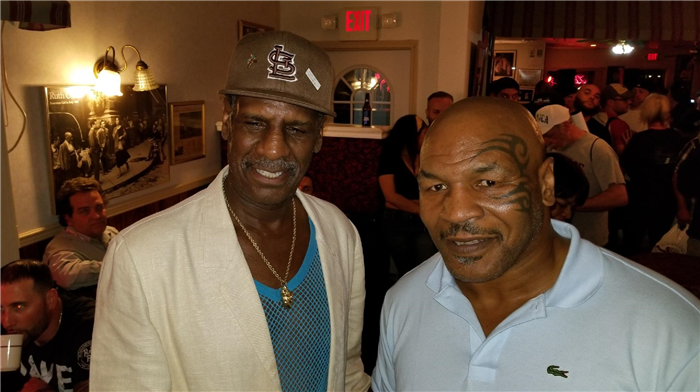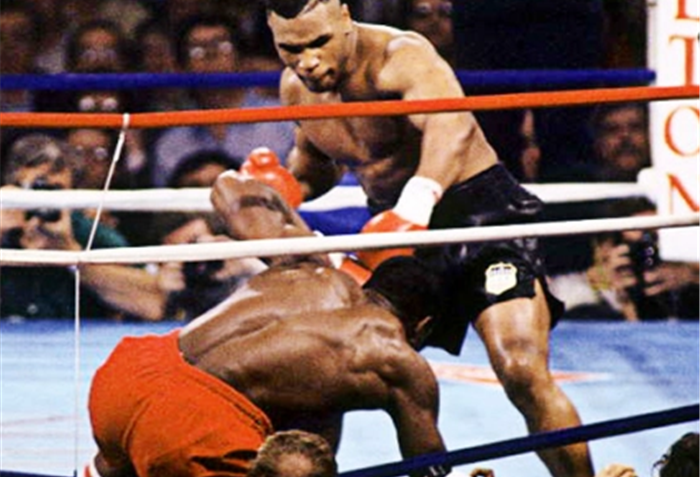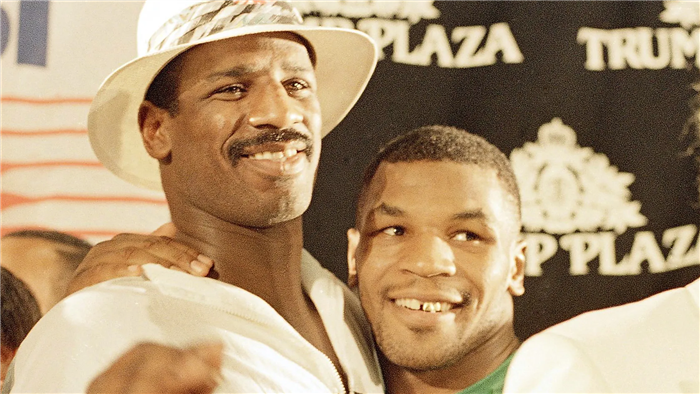It was just after 11 P.M. exactly a quarter of a century ago, and Mike Tyson was steaming:
“Bam! Bam!”
A combination boomed against the dressing room wall. Not against a heavy bag or pads held by a trepidatious trainer. The wall. A fighter’s hands are his livelihood, but in the moment Tyson didn’t care. Something needed to be hit. The wall happened to be the only option that didn’t end in a felony.
Michael Spinks’ flamboyant manager Butch Lewis, according to a Sports Illustrated reporter, made a serious mistake just minutes before Spinks was set to meet Tyson for the unified championship of the world. Lewis decided to anger “Kid Dynamite.” And Spinks would be the one to pay the price.
It started simply and escalated quickly. Lewis’ assistant noticed a lump in Tyson’s left glove while observing his hands being wrapped. Lewis was called over, but barred admission to Tyson’s dressing room. Soon enough, Larry Hazzard, the chairman of the New Jersey State Athletic Control Board, was brought up from ringside to preside over what was quickly becoming a tense situation.

In theory the bump could cause a laceration or cut if rubbed on Spinks’ face:
In truth, the glove was harmless. Eddie Futch, Spinks’ ancient trainer, would soon confirm as much. But Lewis was testing Tyson, pulling “a little psych” as he would later admit. He called foul play.
“Hold it,” he said. “Get rid of that, or we don’t fight.”
Mike Tyson was not amused. This wasn’t the Tyson of today, smiling and telling jokes during his one- man show, a Tyson who, despite a tattooed face, seems quick to please and easy going. This was the 22-year-old Tyson, a walking calamity, seething with anger and, after the hardest year of his life, ready to hurt someone. Anyone.
Thanks to pride, and a pay day estimated at $13 million, Spinks had raised his hand, volunteering to step into the ring with a human wrecking ball. That was the game they both played, the life they had chosen s ince they were very young men. But Spinks, despite the occasional lapse into boxing bravado, was always careful to pay Tyson the proper respect in the months leading up to the fight. The contest was going to be professional, not personal.

Until Lewis.
Now Tyson was going to try to hurt him, as he had hurt Tyrell Biggs.
Biggs had made the mistake of mocking a young Tyson who failed to make the U.S. Olympic team back in 1984. Tyson, who had cried after losing in qualifiers against Henry Tillman, was merely an alternate as he and Biggs flew out to Los Angeles for the Games. When a passerby mistakenly wished him luck, thinking he would be competing, Biggs sneered “she must mean good luck on the flight.”
Tyson never forgot:
His punishment for that remark, three years later, was a beating delivered over seven long rounds. Tyson said he could have finished him early. Instead, he wanted to make him pay, landing punches to the body so hard and so often that Tyson told announcer Larry Merchant he thought Biggs might have actually begun to cry.
“I wanted to do it slowly. I wanted him to remember this for a long time,” Tyson told the media after the fight. “He didn’t show any respect. I was going to make him pay with his health.”
It was an ugly sentiment, but then, boxing is an ugly business. Literary powerhouse Joyce Carol Oates, winner of the National Book Award and the author of On Boxing, spent time with Tyson in his home early in the fighter’s career. Oates was struck by his preternatural power and the nonchalant way he spoke about inflicting tremendous physical harm on his opponents:

There is the unsettling air about Tyson, with his impassive death’s-head face, his unwavering stare, and his refusal to glamorize himself in the ring – no robe, no socks, only the signature black trunks and shoes – that the violence he unleashes against his opponents is somehow just; that some hurt, some wound, some insult in his past, personal or ancestral, will be redressed in the ring; some mysterious imbalance righted. The single-mindedness of his ring style works to suggest that his grievance has the force of a natural catastrophe. That old trope, ”the wrath of God,” comes to mind.
